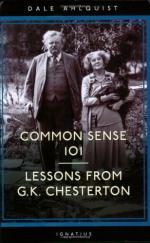|
This section contains 6,708 words (approx. 23 pages at 300 words per page) |

|
SOURCE: “Chesterton as Satirist,” in The Chesterton Review, Vol. VI, No. Fall-Winter, 1979-80, pp. 233-53.
In the following essay, Dooley demonstrates how Chesterton used satire in his poetry and prose not simply as a gently humorous device, but also as a persuasive tool backed by moral substance.
In his book The Amiable Humorist, Stuart M. Tave describes a change in sensibility which took place in the eighteenth century and whose effects we still occasionally observe; it involved a turning away from the unsympathetic, reductive method of wit and ridicule used by Pope and Swift, and the adoption of a species of humour which drew forth tears and sympathy. How strong this emphasis became in the nineteenth century can be illustrated by the tribute Carlyle paid to Jean Paul Richter:
in his smile itself a touching pathos may lie hidden, a pity too deep for tears. He is a...
|
This section contains 6,708 words (approx. 23 pages at 300 words per page) |

|


